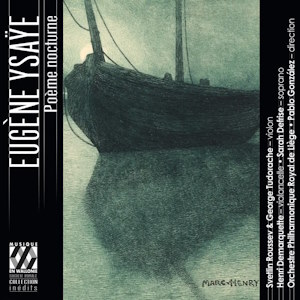
Eugène Ysaÿe (1858-1931)
Poème nocturne
Fantaisie for violin and orchestra, Op.32 (1925)
Petit poème romantique (version for violin and small orchestra) (1901/1914/1920)
Variations on a theme of Paganini, Op.12 (1883)
Salterelle carnivalesque for violin and orchestra, Op.11 (1882)
Poème nocturne for violin, cello and orchestra, Op.29 (1914 rev 1921)
Paraphrase on a theme by Mendelssohn for voice and orchestra (1920)
Svetlin Roussev, George Tudorache (violin), Henri Demarquette (cello) , Sarah Defrise (soprano)
Orchestre Philharmonique de Liège/Pablo González
Text included
rec. 2023, Salle Philharmonique, Liège, Belgium
Musique en Wallonie MEW2409 [61]
Such is the scattered and disorganised nature of Eugène Ysaÿe’s surviving manuscripts that new discoveries are coming thick and fast. The fact that he returned to older works, refashioning them in new forms, allows discs such as this one to dig into his legacy and return with pieces that reflect his compositional impulses at various time in his life. It follows on from previous releases in Musique en Wallonie’s series – Neiges d’antan and Harmonies du soir.
Ysaÿe’s compound of late nineteenth-century virtuosity and twentieth-century harmonic subtlety can be heard in a couple of the later works but this disc is divided broadly into early and late Ysaÿe. His earlier self is encountered in two works composed in rapid succession but to very different effect. The earlier is Salterelle carnivalesque, a brief Wieniawski-like effusion of no great pretension but some style but the later work, written in 1883, is a different matter. This is Variations on a theme of Paganini, with its theme and fifteen varied, inventive and often virtuosic variations, moving between the standard slow-fast, but also cleverly satelliting around the theme. It shows that the challenges set by a great predecessor acted as a spur to Ysaÿe’s creative juices and drew from him a composition of challenging wit and drive.
A number of his works have convoluted histories, and such is the case with the Petit poème romantique heard in the version for violin and small orchestra. Composed in 1901 as Petit fantasie romantique it was reworked in 1914 as Au ruisseau and finally orchestrated in 1920 in the form heard here. Again, it’s a compact piece, no bigger at six minutes than the Salterelle carnivalesque, and full of an unexpected Ysaÿe quality, charm, lightly buttressed by discreet orchestration. Predominantly lyric faster contrastive passages provide the necessary ballast.
The Poème nocturne for violin, cello and orchestra was composed in 1914, revised in 1921 and again in 1924 before it was orchestrated in 1926. It was finally premiered in 1931. It’s a 16-minute multi-sectional work and shows him at his most fluid and open to contemporary harmonic influence. Again, his refined lyric gifts are here but so too is an orchestral sense of twilit colour where veiled romance and virtuosity are allied. The central section is grander, darker and teems with incident and colour with its interchanges between the violin and cello and interjections, especially from the clarinet. As the work develops it becomes more rhapsodic and ends in quiet Rosenkavalier-like reflection.
If this is the artistic highpoint of a disc that should be dipped into with discretion, the final work is the most unexpected, a six-minute Paraphrase on a theme by Mendelssohn for voice and orchestra. The paraphrase is of the Canzonetta: allegretto from the String Quartet in E flat major, a work he’d have known well, and the words are by Ysaÿe himself. They’re printed in the book-format documentation and begin ‘O come, let us make love under the stars’ and continue thus for some time reflecting Ysaÿe’s amorous nature – there’s a charming photograph, one of many, in the book showing him with his last love the violinist Jeanette Dincin on the beach at Knokke-le-Zoute, he in a vast white towelling robe, she standing tiny but protectively next to him, one hand on his robe. It’s a slight but attractive scena sung by soprano Sarah Defrise with a decisive bleat in her voice.
The violin works are divided between Svetlin Roussev, who plays the three larger-scaled works, and George Tudorache who plays the two small-scaled ones. The cellist is Henri Demarquette. Roussev is a particularly able soloist, whom I’ve encountered several times before on disc. As well as being intonationally spot-on he has a pronounced lyric gift and as he shows in the Paganini variations, is adept at the virtuosic demands made on him. The Orchestre Philharmonique de Liège is conducted by Pablo González in an acoustic I initially feared was a touch flat but the ear soon adjusts.
Jonathan Woolf
Buying this recording via a link below generates revenue for MWI, which helps the site remain free




















